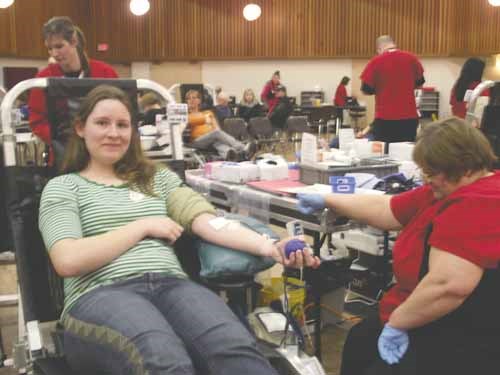While fierce weather at the end of 2013 and beginning of 2014 slowed down pretty much everything, one thing it did not curtail was the need for blood donations leaving Canadian Blood Services (CBS) scrambling to catch up.
In a press release dated January 13, the national blood agency estimated clinics cancelled due to severe weather created a shortfall of approximately 1,200 donations in Saskatchewan and is urgently calling on communities to donate.
"A blizzard may stop us in our tracks, but the need for blood keeps on going, especially when it comes to blood types that are in high demand, like O negative blood," said Mark Donnison, CBS vice president of donor relations. "When seconds count, someone's life is on the line and there's no time to check a patient's blood type, O negative blood is used."
One Yorktonite who answered the call was first-time donor Emma Kerr. The Grade 11 Yorkton Regional High School student couldn't wait to start donating. She became eligible on January 8 when she celebrated her 17th birthday and attended first available clinic on January 13 at St. Mary's.
"It's just a simple thing you can do to make a difference," she said.
Kerr cited one example of a five-year-old girl who has a condition that prevents her body from manufacturing red blood cells. Without weekly blood transfusions the child would not survive.
The blood agency cites other cases of urgency such as heart surgery, which can require up to five donors; internal bleeding, which can take up to eight donors; and car crash victims who may need as many as 50 donors.
One thing that stops people from donating blood is fear. Kerr said she was a little nervous when she got to the clinic, but once it was all over she found out it wasn't bad at all.
"You don't need all of your blood and it doesn't hurt that much," she said.
She also found out it is not a big time commitment. The whole process takes less than an hour, most of which is just administration.
"Giving blood only took about six minutes," Kerr said.
There can be emotional benefits as well.
"I think I would feel better if I ever needed blood if I donated," she said.
The bottom line, Donnison pointed out, is that donating blood saves lives. In fact, a single donor can save up to three lives because the blood is separated into three components, red cells, platelets and plasma, each of which can be given to a different patient.
Individual donors can give up to once every 56 days, which, not coincidentally is exactly how often CBS visits Yorkton.
Kerr is committed and encourages others to do the same.
"I think I will go any time that I can," she said. "I'd say just go; it makes a big difference to somebody else."



